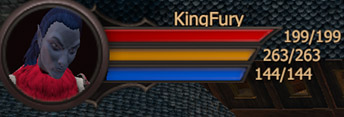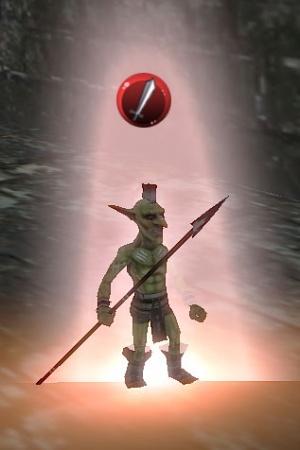This page is meant to be an introduction to combat mechanics in Project: Gorgon.
Contents
Armor, Health and Power
Armor
Armor mitigates 1 point of damage for every 25 points of armor remaining.
Health
Health can be topped up with Potions during combat.
Combat abilities also can heal over time (see Mentalism) or heal by a flat amount.
Power
Power is consumed by using abilities that have a Power cost (most skills include emergency abilities that have no Power requirement, typically with a longer cooldown). The amount of Power available and your ability to recover Power between encounters is significant if you hope to take on more than one enemy at once, or even solo dungeons.
Power can be topped up with potions, which is relatively useful in some situations. The basic ability Dig Deep, which can be placed one the sidebar, can also be used to restore Power (albeit with a long reuse time). Lastly Power regeneration can be enhanced in combat through Mentalism abilities.
Damage
Damage and Health damage are not the same. Health damage bypasses armor.
Effect of Equipment
Soon enough you'll find that equipment has a significant impact on your total damage output and survivability. This seems obvious for an MMO but in Project: Gorgon equipment with bonuses that augment specific abilities is very common. For example "every time you use your Sword Parry ability, regain 10 Health". This type of ability enhancing mods would be found in raid gear in other MMOs.
You character becomes much more powerful once you have multiple pieces of equipment (weapons, armor, amulet) that enhance your choice of skills along with useful ability enhancing mods. Thus committing to your skill choices is important. While you can easily switch between skills, you'll find that even skills of the same level can vary greatly in damage potential unless you also switch your equipment.
Critical Damage
Items sometimes have +xx% to Critical Damage. The default critical damage (not crit. chance) seems to be 125%.
Critical Damage gear is quite uncommon. Archery gear seems to get more of it.
Regeneration In and Out of Combat
Sitting does not accelerate your out-of-combat regeneration unlike in some veteran MMOs. You'll want to find various foods, drinks and snacks to top up your Health and Power between fights.
Regeneration appears to "tick" once every four seconds (so if a food says "+5 Health per update" it means +5 Health every 4 seconds).
Most types of regenerative foods and drinks are crafted or bought. Exceptions are the Mogyar Cheese which drops from Giant Rat, and Milk which can be obtained from the Cows in Serbule with an empty bottle. These are non-negligible sources of Power regeneration which can be very helpful to new players.
Some combat skills such as Mentalism also provide Health, Power and Armor regeneration. Some of the abilities are group-oriented, other abilities are self-help (for example Positive Attitude will quickly restore a small amount of Armor, Health and Power).
In-combat regeneration from foods or drinks is a rarer commodity. There are in-combat Power or Health regeneration potions that can be bought from NPCs or crafted. They tend to be very pricey, and of course have a fairly limited duration.
If you "mezz" a creature for long enough (eg. Tell Me About Your Mother, the "In combat" indicator will disappear and one update of out of combat regeneration will happen, even though the creature is still aggressive.
Rage and Special Attacks
Rage is the energy source that powers monsters’ special attacks. As you hit monsters or they hit you, they gather Rage, and when their meter is full (an orange looking hand), they user their super power.
Many player skills, like Sword and Psychology, have abilities that hamper monster Rage. For example Psychoanalyse will slow down the rate at which the enemy builds rage, while Sword Parry will reduce the enemy's rage by a flat amount.
An enemy's special attacks will be revealed to the player in the target window when the relevant Anatomy skill is of sufficient level (ie. by fighting this type of creature long enough).
You can tell when an enemy uses a special attack by the overhead icon.
“I’m leaving the Rage system alone for now, until we have more players grouping up. Looking at the stats for small group combat, it looks like groups use rage-depletion a little more often. So it may be that I can tailor Rage to be a more compelling group-combat mechanic, where one person in the group has the “rage-keeper” role. That could be interesting.[1]
Movement and Kiting
In a game like this, where you can find all kinds of clever ways to stack speed buffs, it’s possible to run extremely fast. This is a problem in a combat, where the players can be much more mobile than the monsters.
One way the game currently addresses this is that you can not “sprint” backwards, just walk backwards. So if you want to get away quickly, you have to turn around.
“But that change by itself doesn’t solve anything, because the game doesn’t force you to face your target to attack things right now. This means you can turn away from the monster, run down the hall at high speed, and keep shooting arrows — the arrows would go through your head and hit the monster behind you. This is silly and bizarre.[1]
Kiting is something the devs want to address eventually, although it is intended to allow some amount of kiting — "archers should be able to move and get a few extra attacks in".
Vulnerability
Monsters periodically go into this vulnerable state, and some attacks do extra damage against vulnerable monsters, so it’s sort of a whack-a-mole mechanic — you use your vuln-boost ability when you see the monster flashing vulnerable.
A big red glowing thing happens when the monster is vulnerable, plus it makes a sound.
An icon flashes over the monster’s head when they’re vulnerable, and the tutorial cave has an explanatory tip about this (when you get your first Sword ability that does extra vuln damage).
Looting Enemies!
(blurb about skinning, butchering, burying)
When an enemy drops special loot (cyan, yellow, purple colour), there is a distinctive sound and a particle effect.


